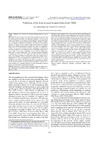Please use this identifier to cite or link to this item:
https://accedacris.ulpgc.es/jspui/handle/10553/40189
| DC Field | Value | Language |
|---|---|---|
| dc.contributor.author | Alemán Ruiz, Iván | en_US |
| dc.contributor.author | Calvo-Francés, Fernando | en_US |
| dc.date.accessioned | 2018-06-07T12:05:03Z | - |
| dc.date.available | 2018-06-07T12:05:03Z | - |
| dc.date.issued | 2017 | en_US |
| dc.identifier.issn | 0212-9728 | en_US |
| dc.identifier.uri | https://accedacris.ulpgc.es/handle/10553/40189 | - |
| dc.description.abstract | Social Support is one of the most well documented factors influencing health outcomes. Cultural differences and language use between Spain and other Spanish-speaking countries advise caution in the use of the same measurement instruments. Furthermore the instruments validated in Spain have been developed with very specific or small samples. The aim of this instrumental study was to develop a new general purpose Social Support Questionnaire that overcomes these limitations. Method: With a sample of 1080 participants (48.2% women, mean age 33.51), an exploratory and confirmatory factor analysis was conducted, examining its internal consistency, reliability, convergent validity, content validity and readability. Results: A three-factor structure (Friends, Family and Significant Others Support) was replicated and confirmed (with a very good fit), explaining nearly 73% of the variance with an excellent internal consistency (.94 or more) with significant evidence of convergent validity with other related measurements of Social Support and Health. Conclusions: The parameters of structural validity, internal consistency, reliability and convergent validity, taken together, present an optimized profile when compared to the rest of the reviewed surveys. | en_US |
| dc.description.abstract | El Apoyo Social es uno de los factores determinantes del nivel de salud mejor documentados. Las diferencias culturales y en el uso de la lengua entre España y otros países de habla española aconsejan prudencia en el empleo de los mismos instrumentos de medida. Además, los instrumentos validados en España se han basado en muestras muy específicas y pequeñas. El objetivo de este estudio ha sido el desarrollo de un cuestionario de Apoyo Social para propósitos generales que supere esas limitaciones. Método: se llevaron a cabo análisis factoriales exploratorio y confirmatorio, así como un estudio de la consistencia interna, la fiabilidad, validez convergente, validez de contenido y legibilidad en una muestra de 1080 participantes (48.2% mujeres, edad media 33.51). Resultados: hallamos, replicamos y confirmamos (con muy buen ajuste) una estructura de tres factores (Apoyo de Amigos, Familia y Personas Relevantes) que explican una varianza cercana al 73%, con una excelente consistencia interna (.94 o más) y fiabilidad, y con indicios significativos de validez convergente con otras medidas de Apoyo Social y de salud relacionadas. Conclusiones: los parámetros de validez estructural, consistencia interna, fiabilidad y validez convergente tomados en su conjunto, presentan un perfil optimizado en comparación con el resto de los cuestionarios revisados. | en_US |
| dc.language | eng | en_US |
| dc.relation.ispartof | Anales de Psicologia | en_US |
| dc.source | Anales de Psicologia[ISSN 0212-9728],v. 33, p. 168-179 | en_US |
| dc.subject | 32 Ciencias médicas | en_US |
| dc.subject.other | Social support | en_US |
| dc.subject.other | Exploratory factor analysis | en_US |
| dc.subject.other | Cross-validation | en_US |
| dc.subject.other | Confirmatory factor analysis | en_US |
| dc.subject.other | Internal consistency | en_US |
| dc.subject.other | Reliability | en_US |
| dc.subject.other | Convergent validity | en_US |
| dc.subject.other | Apoyo social | en_US |
| dc.subject.other | Análisis factorial exploratorio | en_US |
| dc.subject.other | Análisis factorial confirmatorio | en_US |
| dc.subject.other | Consistencia interna | en_US |
| dc.subject.other | Fiabilidad | en_US |
| dc.subject.other | Validez convergente | en_US |
| dc.subject.other | Validación cruzada | en_US |
| dc.title | Validación de la escala de vínculos interpersonales de apoyo VIDA | en_US |
| dc.title.alternative | Validation of the interpersonal support links scale VIDA | en_US |
| dc.type | info:eu-repo/semantics/Article | es |
| dc.type | Article | es |
| dc.identifier.doi | 10.6018/analesps.33.1.232341 | |
| dc.identifier.scopus | 85007556355 | |
| dc.identifier.isi | 000389110200020 | |
| dc.contributor.authorscopusid | 57192709807 | |
| dc.contributor.authorscopusid | 6506751854 | |
| dc.description.lastpage | 179 | - |
| dc.identifier.issue | 1 | - |
| dc.description.firstpage | 168 | - |
| dc.relation.volume | 33 | - |
| dc.investigacion | Ciencias de la Salud | en_US |
| dc.type2 | Artículo | en_US |
| dc.contributor.daisngid | 34449863 | |
| dc.contributor.daisngid | 8833537 | |
| dc.contributor.wosstandard | WOS:Aleman-Ruiz, I | |
| dc.contributor.wosstandard | WOS:Calvo-Frances, F | |
| dc.date.coverdate | Enero 2017 | |
| dc.identifier.ulpgc | Sí | es |
| dc.description.sjr | 0,402 | |
| dc.description.jcr | 0,756 | |
| dc.description.sjrq | Q3 | |
| dc.description.jcrq | Q4 | |
| dc.description.sellofecyt | Sello FECYT | |
| dc.description.scie | SCIE | |
| dc.description.ssci | SSCI | |
| dc.description.dialnetimpact | 1,0 | |
| dc.description.dialnetq | Q1 | |
| dc.description.dialnetd | D2 | |
| dc.description.erihplus | ERIH PLUS | |
| item.grantfulltext | open | - |
| item.fulltext | Con texto completo | - |
| crisitem.author.dept | Departamento de Enfermería | - |
| crisitem.author.orcid | 0000-0002-4282-5049 | - |
| crisitem.author.fullName | Calvo Francés, Fernando | - |
| Appears in Collections: | Artículos | |
SCOPUSTM
Citations
7
checked on Jun 8, 2025
WEB OF SCIENCETM
Citations
4
checked on Feb 25, 2024
Page view(s)
172
checked on Jan 9, 2026
Download(s)
91
checked on Jan 9, 2026
Google ScholarTM
Check
Altmetric
Share
Export metadata
Items in accedaCRIS are protected by copyright, with all rights reserved, unless otherwise indicated.
